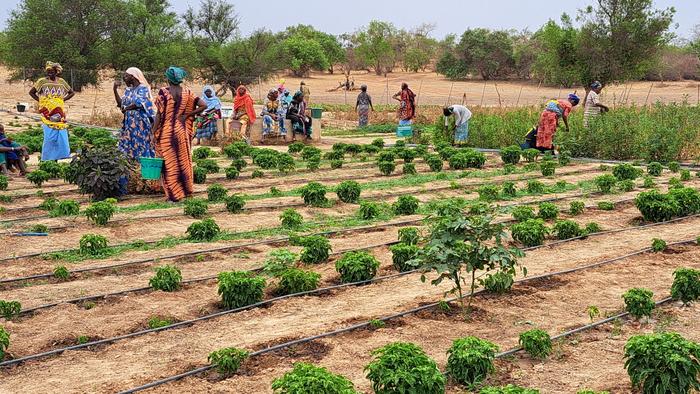The agricultural sector is one of the pillars of the central African country’s economy with an estimated contribution of 15 percent to the GDP in 2018 and a significant portion of the population in rural area (60%) which continues to depend directly on farming for their livelihoods, according to the Food and Agriculture Organization of the United Nations (FAO).

Credit: Issa Ouedraogo
The agricultural sector is one of the pillars of the central African country’s economy with an estimated contribution of 15 percent to the GDP in 2018 and a significant portion of the population in rural area (60%) which continues to depend directly on farming for their livelihoods, according to the Food and Agriculture Organization of the United Nations (FAO).
In Evaluating rural household well-being and empowerment among women and young farmers in Senegal, published in the international journal Data in Brief, researchers conducted a survey of over 1500 smallholder farming households from the Sedhiou and Tambacounda regions in southern Senegal, with 70 percent of respondents being women over 35 and 30 percent being people between the ages of 18-34.
“The idea of our review was to empower women and young people,”
says lead author Cyrus Muriithi, a researcher and data analyst for the Alliance of Bioversity International and CIAT.
The researchers say that the data gathered in the survey highlights a significant knowledge gap about women and youth farming practices in the prevailing climate change conditions (droughts due to increasing temperatures).
Empowering Women and Youth Farmers
Rural women are almost 70 percent of Senegal’s workforce and produce 80 percent of the country’s national food supply, while more than 60% of Senegal’s population is under the age of 25.
Muriithi explains that despite this demographic shift, both women and youth are excluded from day-to-day decision-making processes on farms.
“There is a lot of discrimination in terms of who controls the resources, they favor men over women, especially in the more lucrative parts of the supply chain — women are expected to do the housework and also go to the farm,”
he says, adding that although children are still expected to participate in farm labor, few youth see agriculture as an appealing occupation.
“Most women don’t have access to a mobile phone, it’s the husband who has the access,” Issa Ouedraogo, a senior scientist and country representative for Senegal for the Alliance of Bioversity International and CIAT says,
“You can have innovation but if you don’t have access to land, it’s hard to implement.”
Muriithi points out that since the majority of people in these areas depend on local agriculture for 90% of their diet, improving agricultural skills can benefit both communities economically.
“One way to achieve this is through training and access to efficient markets where farmers and traders have information and is already incorporated in the price mechanism,” he says, “For example, when farmers receive good prices for their crops, young individuals can earn more money compared to if they sought employment in urban areas.”
Ouedraogo explains that because traditional cultural indicators of agricultural information, like the migration of birds or insects, flourishing of specific plant species and other signs, are being disrupted because of climate change, innovation is urgently needed.
“The older men own the land and the equipment, and now even though the young people have access to innovative techniques or information, it’s hard to convince the elders to make the change,” Ouedraogo says,
“But young people are already exposed to innovation and they can train older people.”
Climate Smart Agriculture
The researchers say one of the key uses of the survey is to understand the impact of the adoption of Climate Smart Agriculture (CSA) practices, a set of agricultural processes and technologies which aim to boost productivity, enhance resilience and reduce GHG emissions.
Ouedraogo explains that the most useful part of these practices is climate information services, that is, the provision of data and knowledge to inform agricultural decision making.
“In all developed countries, farmers are exposed to a wide range of climate information that they can access from their smartphones, but this isn’t the case in rural Senegal,” he says, adding that now, thanks to new initiatives, farmers in Senegal have access to weather and climate information to make better, timely decisions.
“Before, farmers had to sow their millet seed and hope that in the coming week, a big rain would fall, but now a farmer can receive via text message with the exact date of the onset of the rainy season, reducing wasted seed,” Ouedraogo says, adding that climate information can also help determine when and how to use fertilizers, pesticides and other inputs.
Scaling Up
The researchers hope that the data gathered during the survey will help research and development partners formulate policies and development strategies aimed at smallholder farming households, with a focus on women and youth empowerment.
Ouedraogo says that work is already underway with working with youth and women to implement new initiatives and scale existing ones.
“There are calls to scale up small scale irrigation initiatives and it’s the same for nutrition initiatives to change ways of thinking in terms of cooking and improve the nutritional value of the food,” he says.
The researchers say the baseline survey data can also inform the development of tailored and adaptive agricultural interventions for smallholder farming households, particularly programs targeting women and youth.
The Alliance of Bioversity International and CIAT has been working in Senegal since 2011 and opened its official country office in Dakar in 2022, with the goal of deepening its activities in the country.
Journal
Data in Brief
Method of Research
Survey
Subject of Research
People
Article Title
Evaluating rural household well-being and empowerment among women and young farmers in Senegal
Article Publication Date
12-Jan-2024



